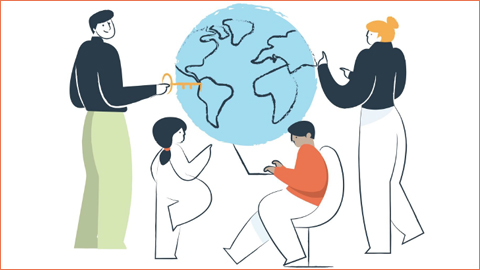The UAB creates tools to raise awareness on the role of minors as interpreters for migrants

UAB researchers have developed open-access material to raise awareness among lecturers and students of the translation and interpreting tasks that fall on children and teenagers from migrant families, both at school and socially. These resources are the result of two research projects, presented at the seminar on "Young interpreters: language intermediation as a diversity inclusion tool", held on 27 June at the Faculty of Translation and Interpreting.
27/06/2022
The seminar, organised by the research group in Mediation and Interpretation: Research in the Social Area (MIRAS), marked the end of the two projects the researchers had been working on during these past years: the strategic association EYLBID “Empowering Young Language Brokers for Inclusion in Diversity”, co-funded by the European Union's Erasmus+ programme, and the project ILM “Intermediació Lingüística per part de Menors”, funded by the Spanish Ministry for Science, Innovation and Universities.
In charge of inaugurating the seminar was Màrius Martínez, Vice Rector for International Relations of the UAB; Susanna Naranjo Ordóñez, General Director of Inclusive Education and Languages of the Catalan Ministry for Education, and Mireia Vargas-Urpí and Marta Arumí, coordinators of the EYLBID-UAB project. The seminar also included a conference by Professor Marjorie Orellana from the UCLA School of Education and Information Studies.
The difficult task of being a young interpreter in Europe
The EYLBID project consisted in a partnership of five higher education institutions and one social enterprise, and focused on language brokering conducted by adolescents, who play an important role in migratory processes. They are often in charge of such complex tasks as interpreting and translating, acting as a bridge of communication between their families and the outside world, between minority and majority communities. With the aim of raising awareness about these children and adolescents at school and among society in general, the results of the project will be shared with secondary school teachers and students across Europe. The project aims to contribute to the respect towards language diversity and cultural wealth, and to foster a flexible attitude towards cultural diversity and traditions.
Adventures of a Young Language Broker
The project worked on creating open-access, free and multilingual materials: a video game, a manual for teachers and video capsules.
The video game is available in English, Catalan, Spanish, German and Italian, and can be downloaded here. The game is called Adventures of a Young Language Broker and include several scenarios and mini-games in which adolescents can discover what it feels like to be a langauge broker at school and the type of decisions and situations these young interpreters face daily. Teachers are also able to consult the video game manual, with tips and guidelines on how to use the game as a classroom activity.
The English version of the manual, entitled Inclusion, Diversity and Communication Across Cultures: A Teacher's Book with Classroom Activities for Secondary Education, is also available and can be downloaded here. The other versions will be made available shortly on the EYLBID website.
The manual is addressed to teachers and invites them to work with their students to explore some of the complexities involved in having children and adolescents take on this role in modern societies. With six chapters: Languages in our everyday life; Culturally diverse societies; Translation and interpreting: bridges across languages and cultures; What is child language brokering? Why does it exist?; Emotional impact, identity and relationships: guidelines for using students as language brokers in schools; and Careers in languages, each includes a theoretical part and also practical exercises for secondary school level and adolescent students. There are notes with pedagogical explanations for teachers and all of the material necessary for the classroom activities.
Language Brokering in Catalonia
The MIRAS group also presented the results of its ILM project, a research on the situation of language brokering by children and adolescents in Catalonia. The study was based on questionnaires addressed to secondary school teachers and social workers, interviews with young adults and parents from the main migration groups presents in Catalonia, and a discussion group with adolescents in a secondary school centre.
The research points out that, in the education sector, over half of teachers surveyed affirmed turning to plurilingual students when needing to communicate with mothers and fathers who do not speak Catalan nor Spanish, a figure well over the 15% of cases who turn to professionals such as public service professionals or intercultural mediators. The interviews with young adults who had acted as language brokers while attending school revealed the emotional impact and adultification (i.e., being handed adult responsibilities from a young age) that these tasks often imply. The main results of the study can be consulted in the reports and articles published on the project's website.
Based on these research results, the researchers created dissemination and awareness-raising materials intended to cater to the needs of users in Catalonia, such as an infograph for the education sector, available on the website, with good practices and explanations on the most frequest situations. They also created a series of video with young people who are currently or have been language brokers in different public service sectors. The videos can be viewed on the MIRAS YouTube channel.